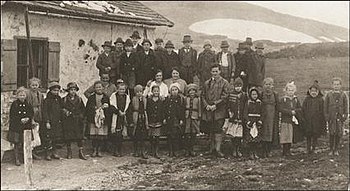 Wittgenstein (front, seventh right) with his pupils, taken in Puchberg am Schneeberg, spring 1923 | |
| Date | April 1926 |
|---|---|
| Location | Otterthal, Austria |
| Participants | Ludwig Wittgenstein (1889–1951) Josef Haidbauer (c. 1915–c. 1929) |
| Inquiries | Proceedings began at the district court in Gloggnitz on 17 May 1926; outcome unknown |
The Haidbauer incident, known in Austria as der Vorfall Haidbauer, took place in April 1926 when Josef Haidbauer, an 11-year-old schoolboy in Otterthal, Austria, reportedly collapsed unconscious after being hit on the head during a class by the Austrian philosopher Ludwig Wittgenstein.[1]
Wittgenstein taught philosophy at the University of Cambridge from 1929, but a decade earlier had trained as a school teacher in Austria. It was while working at a village elementary school that the Haidbauer incident took place.[2]
The boy's collapse was reported to the police, and Wittgenstein was summoned to appear in court in Gloggnitz on 17 May 1926, where the judge ordered a psychiatric report.[3] According to the philosopher William Warren Bartley, the hearing exonerated Wittgenstein,[2] although the Wittgenstein biographer Alexander Waugh writes that the outcome of the case was never published. Waugh argues that Wittgenstein's family may have had a hand in making the issue disappear.[4]
Haidbauer was not the only pupil Wittgenstein was alleged to have struck. Ten years later, while working at Cambridge, he returned to the villages, to a mixed reception, to ask for the children's forgiveness.[5]
- ^ Ray Monk, Ludwig Wittgenstein: The Duty of Genius, Free Press, 1990, p. 232.
- ^ a b W.W. Bartley, III, Wittgenstein, Open Court, 1994 [1973], pp. 107ff.
- ^ Alexander Waugh, The House of Wittgenstein: A Family at War, Random House of Canada, 2010, p. 149.
- ^ Waugh, The House of Wittgenstein, p. 162.
- ^ Cite error: The named reference
Monk370-372was invoked but never defined (see the help page).